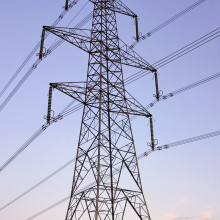Anders asked the electrifying question, "Why do power lines make so much noise?";. This seemed rather complicated so Charis Lestrange asked Dr Andrew Griffiths, a semiconductor engineer from the company IQE.
In this episode

00:00 - Why do power lines make so much noise?
Why do power lines make so much noise?
Charis - On Facebook, Rachel speculates that it’s when there's too much electricity and some tries to escape whereas Henry thinks it’s down to vibrations, or as Steven said, “Good vibrations.” Meanwhile Andrew Griffiths is a semiconductor engineer from the company IQE…
Andrew - In power lines themselves, the noise is usually due to something called a corona discharge which is when the electric field is strong enough to make the surrounding air conduct. The sound you're hearing is a transfer of energy from the power line to the surrounding air. Designers of power lines want to avoid this noise as it results in a power loss. But it’s partially dependent on atmospheric conditions such as the air pressure and humidity. For example, if it rains, the noise can become louder due to the increased humidity, and addition of water droplets in the surface of the wires. This creates a more conductive environment. The corona discharge and therefore the noise can be reduced by making sure the power lines are thicker and the space in between the power lines is sufficient. This energy loss can also be reduced by decrease in the voltage. However, if we decrease the voltage, the current then increases. This increased current causes more power loss due to heating so you have to balance how much energy high voltage loses in noisy corona discharge and how much low voltage transmission would lose in heat.
Charis - But why does the discharge produce a steady buzzing sound?
Andrew - Electricity is distributed to homes by alternating current. Alternating current is where electric current moves backwards and forwards at 50 times a second. Any noise that you hear in power lines or transformers is associated with this frequency.
Charis - So the noise is a 50 hertz buzz produced as the voltage rises and falls in the cable, 50 times per second. But what causes the voltage in current to alternate like this in the first place?
Andrew - Domestic electricity is generated by a process called electromagnetic induction which converts movement into electricity. It does this by rotating a magnet relative to some wires. As the magnet turns, the voltage goes positive and negative because of how the wires are set up. This positive and negative changing voltage pushes and pulls the current in two directions.
Charis - Thank you to Andrew Griffiths from IQE for that answer.
Related Content
- Previous Could you be an astronaut?
- Next Where do deleted texts go?










Comments
It would be great if you put
It would be great if you put the text of the audio file in page for the ones that doesn't understand English exactly
Add a comment